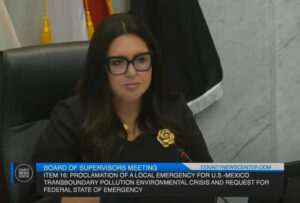
The Tijuana sewage crisis has been declared a local state of emergency after the San Diego County Board of Supervisors unanimously approved the move at a board meeting on June 27.
The first-ever emergency declaration came after a revelation that the $300 million the United States has already allocated to the issue will fall far shorter of solving the problem than originally thought after officials discovered $150 million in deferred maintenance needs at one of the project sites.
“We’ve heard that the (South Bay) International Wastewater Treatment Plant is in severe need of rehabilitation,” said Paloma Aguirre, mayor of Imperial Beach. “That’s going to eat into the $300 million that we’ve secured.”
The U.S. and Mexico last year reached an agreement to fund projects addressing Tijuana’s faulty sewage system that pushes untreated sewage into the Tijuana River and coastal waters, prompting beach closures. In addition to U.S. funding, Mexico contributed $144 million.
The funding would not have fully solved the problem, but it made a significant dent in the projects needed to do so. With this setback and without additional funding, Aguirre said, a solution could take years or even a decade longer.
“With increased projected rainfalls and especially a strong El Nino, we’re going to have literal wastewater flooding our communities,” she said. “The situation is very dire.”
Tijuana’s faulty sewage system has caused transboundary contamination for decades. The problem is exacerbated by heavy rainfall, which pushes untreated sewage into the Tijuana River and coastal waters. Last winter was abnormally wet, and the region is still feeling its impact.
The county’s emergency declaration will escalate the matter to Sacramento. If Gov. Gavin Newsom declares a state-level emergency, it will advance to the federal level.
Meanwhile, Rep. Scott Peters asked Mexico to consider short-term solutions to keep beaches clean and to provide regular updates on projects underway across the border.
“Our constituents are clamoring for an end to this crisis, and while we know that these investments will take some time to deploy, we respectfully request that your office keep us apprised of the progress being made,” Peters wrote in a letter to Marina del Pilar Avila, governor of Baja California.
“Specifically, we would like to know when you plan to break ground on a new treatment facility at San Antonio de los Buenos (SAB),” the letter continues.
Peters asked whether Mexico would consider dredging settling ponds at SAB and adding chemical treatments that may reduce beach closures north of the border. The Imperial Beach shoreline has been closed since Dec. 2022, while Coronado and Silver Strand Beaches have been closed intermittently throughout the year.
 “Contamination in the Tijuana River Valley has negatively impacted the health of the border and coastal communities of San Diego for far too long,” said Nora Vargas, chair of the county board of supervisors, who proposed the emergency proclamation with Vice Chair Terra Lawson-Remer.
“Contamination in the Tijuana River Valley has negatively impacted the health of the border and coastal communities of San Diego for far too long,” said Nora Vargas, chair of the county board of supervisors, who proposed the emergency proclamation with Vice Chair Terra Lawson-Remer.
The declaration also prompts the county’s administrative team to assess the economic impact of the transboundary sewage flow on San Diego. The report will return to the board for review within 120 days.
County staff received 119 comments ahead of the meeting, 110 in favor of the emergency declaration. During public comment, 23 people spoke, overwhelmingly in favor of the move. Critics argued that the U.S. was already shouldering the bulk of a problem that originated in Mexico and questioned why Baja California was not contributing more.
Lawson-Remer, in her comments in support of the declaration, noted that a federal state of emergency would send a message to the Mexican government.
“Until the dilapidated wastewater treatment plant in Mexico is fixed, we will still be fighting an uphill battle,” she said. “We cannot spend years waiting for these fixes to be made; we need action now. It’s time to put an end to this crisis.”




